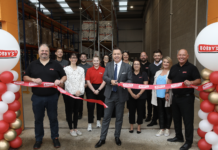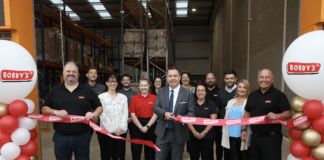Consumers and retailers’ changing demands mean that wholesalers need to reconsider what they need from their fleet, says Toby Hill.
The complexity of wholesalers’ logistics operations is increasing. As a result of this, more businesses are choosing to invest money in new commercial vehicles tailored to their precise operational needs.
Complicating this further is an ever-evolving system of regulations, as governments seek to combat over-congestion, pollution and global warming, among other issues.
Van manufacturers are responding to these many challenges and opportunities with fast-moving innovation.
“We are cascading a lot of our specialist truck knowledge down to the vans,” explains Grahame Neagus, head of light commercial vehicles at Renault Trucks Master. “Our Optilogistics van includes a walk-through facility from the cab to the back of the van. Combined with a sideload door to the pavement, this means that a driver doing multiple urban drops is not continually getting in and out into traffic – making for a much safer, smoother operation.”
Further innovations on the Optilogistics vehicle include an on-board telematics system, which was also first developed in the truck industry. This generates a vast range of data that operators can use to hone their operations, evaluating issues from fuel economy to driver performance to the efficiency of alternative routes.
Other features that come with the van which Neagus recommends for wholesalers include on-board weighing and a 360º camera system.
“If you are carrying highly desirable products such as alcohol or tobacco, this provides great security,” he explains. “It enables the driver to see right around the vehicle and all footage is recorded on a hidden hard drive.”
Storage capacity
Another important issue for food and drink distributors is chilled and frozen storage capacity.
“Fridge bodies are very heavy. Combining them with manoeuvrability and a compact vehicle footprint is a technical challenge we have dedicated a lot of resources to mastering,” explains Richard Waterworth, head of sales at Isuzu.
The brand’s 7.5-tonne Isuzu Forward range has multi-compartment refrigerated bodies with moveable bulkheads, enabling wholesalers to balance their storage between chilled and frozen compartments.
Of course, choosing the right vehicle is not just about its features. Financing and maintenance are also important.
“Rather than looking simply at RRP, customers should always consider whole-life costs,” advises Kate Thompson, communications head at Volkswagen Commercial Vehicles. “This, of course, takes into account monthly payments or upfront costs, but also includes fuel economy, servicing costs and – importantly – the residual value or how much the van is worth at the end of its life.”
There are 72 Volkswagen Van Centres across the UK, each of which has a finance expert on hand. The experts can analyse the requirements of each business and recommend the most suitable payment plan.
Another core consideration for wholesalers when choosing what commercial vehicles to invest in is maintenance. The increasing complexity of many vehicles means that, in most cases, self-maintenance is no longer an option.
“We offer fixed repair and maintenance contracts tailored to the requirements of each particular vehicle,” says Isuzu’s Waterworth. “All our vehicles are backed by a three-year mileage warranty that includes roadside assistance.”
Over at Renault Trucks, maintenance services are available at dealerships 24 hours a day. This is an advantage for FMCG wholesalers, as Neagus explains. “This means distributors can take their vehicle into one of our dealers at three in the morning to get it serviced, so it does not disrupt delivery logistics the next day,” he says.
Finally, a somewhat larger threat has appeared on the horizon: global warming. Increasingly, legislation is being passed to tackle the transport sector’s contribution (estimated to be around 14% of global greenhouse gas emissions), as well as the greater pollution caused by diesel.
For this reason, Iveco recommends that buyers consider looking beyond diesel.
“Our range of natural gas-powered commercial vehicles provide a genuine alternative to diesel,” says Martin Flach, alternative fuels director at the vehicle manufacturer. “A gas-powered fleet improves air quality, reduces noise pollution and on average reduces fuel costs by 25%.”
Iveco’s Daily, Eurocargo and Stralis vans are all now available in gas under the firm’s Natural Power logo.







